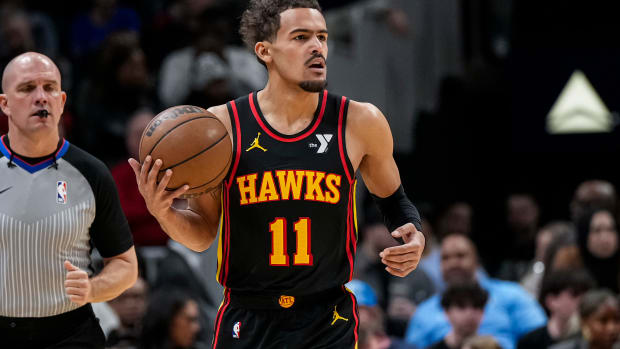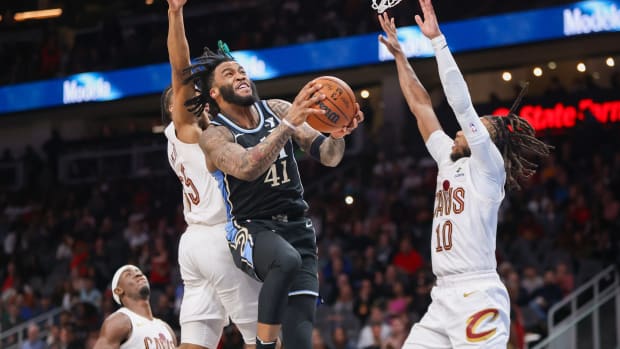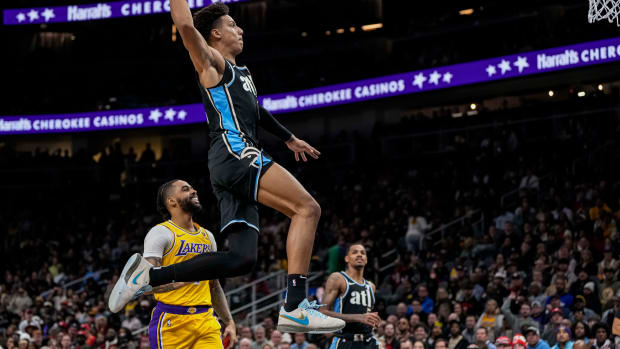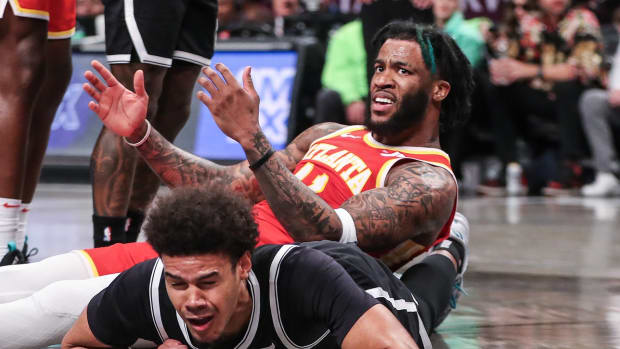Hawks Player Preview: John Collins
Despite the flashes Trae Young showed as a rookie, the promise of DeAndre Hunter, Kevin Huerter’s sweet shooting, and Cam Reddish’s teasing upside, John Collins might have the most to say about the Hawks’ success – or failure – in the coming era. Even among those most closely focused on the NBA, opinions of Collins vary widely. He has already established a baseline as a productive and efficient offensive big man, with a range of skills to round into one of the more versatile big men in the Eastern Conference. His per-game numbers are impressive and his offensive impact undeniable. He has, however, also struggled mightily on defense despite an encouraging rookie season and could lack the upside on that end of the floor to solidify the Hawks’ core.
As currently constructed, Atlanta’s most promising long-term players are Young, Huerter, Reddish, Hunter, and Collins – all of whom project as starters. In that theoretical lineup, Collins is the only big man and would therefore be expected to anchor a defense already working from a talent disadvantage. If he can’t provide a strong defensive backbone, it makes it meaningfully more damaging for those five to play together. Collins’ block and steal rates plummeted in his second year while his defensive rebounding plateaued. The Hawks allowed over 120 points per 100 possessions in 821 minutes when Collins played without a center beside him – a mark that would rank among the worst defenses of all time over a full season.
That doesn’t all fall upon Collins. Atlanta had some of the worst defensive personnel in the NBA last season and Collins, still just 22, missed 21 games. Overall, Atlanta was better defensively with him on the court than with him off – a product of frequently sharing the floor with Alex Len and Dewayne Dedmon – and he has the mobility and strength to defend several positions. His troubles come away from the ball, where he can be prone to spacing out or diagnosing plays too slowly. The impressive physical tools Collins possesses to little good if he can’t position himself to use them properly. While he cut down on his fouling in Year Two, he still tends to reach and bring his hands down when challenging shots – often as an attempt to compensate for poor positioning.
The Hawks don’t need Collins to be elite on defense, only passable enough to get by. They figure to have one of the league’s best offenses during Young’s prime, and Collins should play a prominent role in it. While Young is the unambiguous engine of the attack, Collins is the counterbalance that keeps defenses honest. He might stand to gain the most from Young’s gravity and the front office’s vision to surround him with shooting, and is already one of the league’s most explosive finishers at the rim. He has the roll gravity not only to decimate opponents at the basket, but to open up the floor for teammates:
Unsurprisingly, Collins ranked in the 79 percentile finishing as a roll man, and had 157 dunks last year despite missing a quarter of the season. Atlanta’s offense improved by nearly nine points per 100 possessions with Collins on the floor – a mark that ranked in the 96 percentile leaguewide. He upped his efficiency and reduced turnovers – even under heavier usage – while extending his game beyond the three-point line in earnest (34.8 percent on 2.6 attempts per game). If opponents didn’t already have enough to consider when defending Young and Collins, they’ll certainly have their hands full if the big man’s jumper poses a legitimate threat.
Lloyd Pierce plans on using Collins primarily at power forward this season, though he’ll likely experiment with small lineups featuring Collins at center. But even in bigger alignments, he’ll be under heavier scrutiny without Dedmon – now with the Sacramento Kings on a three-year, $40 million deal – providing him two-way cover. Dedmon was the Hawks’ most consistent – and, at times, best – all-around big man in 2019, dispensing stout rim protection and reliable floor spacing at center. Alex Len, while quietly productive last year, just doesn’t afford the same luxuries. Both will be asked to do more on defense, and Collins in particular should be given more offensive responsibility. How he handles it will offer a clearer picture of what he can do – and what Atlanta can do with him.





